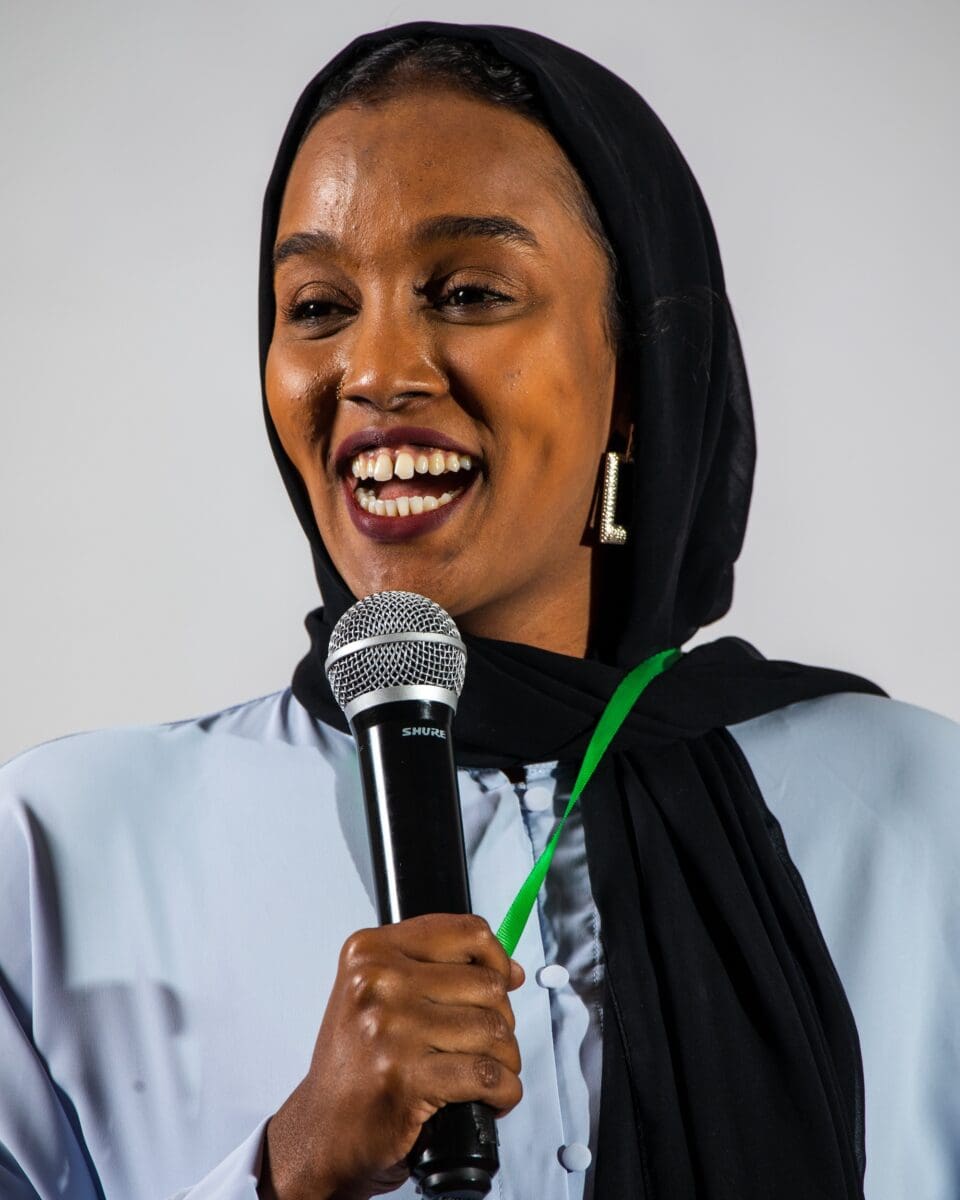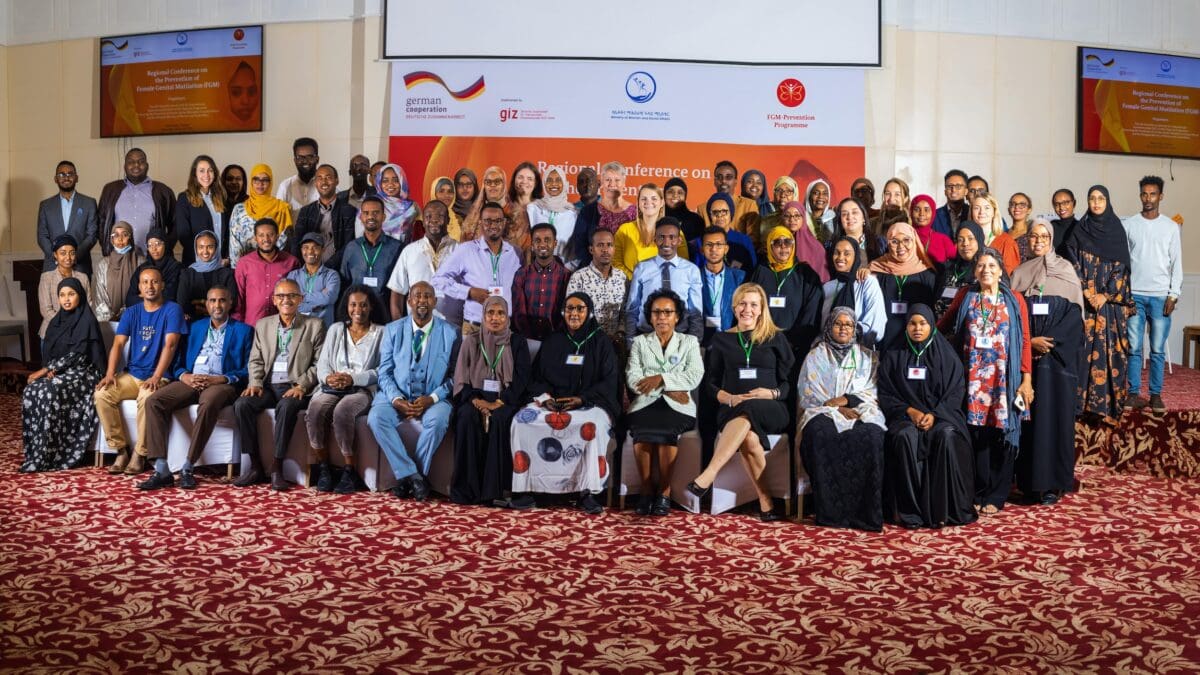Local partners in Ethiopia, Somalia and Sudan start implementing Generation Dialogues
With German support, non-governmental organisations in the Horn of Africa have begun to implement Generation Dialogues to prompt communities to reassess traditional practices such as female genital mutilation that can cause lasting harm. First responses are overwhelmingly positive.

‘It is great to witness how younger and older people listen to each other and treat each other with respect,’ says Fartuun Herai, a programme coordinator with the non-governmental organisation Elman Peace Center. Fartuun was speaking on the third day of the Regional Conference on Female Genital Mutilation which was jointly hosted by Ethiopia’s Ministry of Women and Social Affairs and Deutsche Gesellschaft für Internationale Zusammenarbeit (GIZ) in Addis Ababa in November 2023. ‘I believe that Generation Dialogues make change possible because they enable community members to be open with one another about their lived experiences, fears and hopes’.
The regional project ‘Improving the Prevention of Female Genital Mutilation’, implemented by GIZ on behalf of the German Federal Ministry for Economic Cooperation and Development (BMZ), had invited its non-governmental implementing partners from Ethiopia, Somalia (including Somaliland) and Sudan to exchange on lessons learned as they implemented the Generation Dialogue approach for the first time. Government representatives from Ethiopia and Somalia, as well as civil society actors from all three countries, listened with interest as Dialogue coordinators and facilitators shared their experiences and the new insights they gained.
A region where FGM is widely practiced – and where traditions are held in high esteem
The Horn of Africa region is home to some of the countries with the highest prevalence of female genital mutilation in the world. In Ethiopia, Somalia and Sudan, the regional project’s three partner countries, 65,2%, 99,2% and 86,6% of women and girls are reported to have undergone the practice (see FGM/C Research Initiative, 2019-2023). In each of the three countries, the population is composed of many different ethnic groups, each bringing their own customs and traditions. There are marked differences between urban and rural population groups, too. However, research shows that, across these divides, many parents in the region regard FGM as a precondition for their daughters’ marriageability and as a safeguard for their economic and social futures. They are skeptical of approaches that seek to discourage FGM which, from their point of view, lack respect for the local culture and its traditions.
Working with a broad spectrum of partners and communities
Aware of the cultural sensitivity of the issue, and of the Ethiopian, Somalian and Sudanese governments’ determination to end the practice of FGM, BMZ proposed a regional project to raise awareness about the harmful consequences of FGM and to support the implementation of Generation Dialogues, an approach based on careful listening and appreciation of local customs and traditions. Implementation agreements were concluded with five local partners: Elman Peace Centre (EPC), Puntland Minority Women Development Organisation (PMWDO) and Tearfund Somaliland in Somalia; Relief and Development for the Vulnerable (RDV) in Ethiopia; and Cafa Development Organisation in Sudan.
While implementation in Sudan had to be temporarily suspended due to the conflicts that broke out in Khartoum, the other four partners all managed to select suitable communities with whom they completed all seven steps of the Dialogue approach over the course of 2023. Partner communities comprised one rural and one urban community, a community of pastoralists and a community of internally displaced people living in a camp. Elman Peace Center produced this short film about implementing the Generation Dialogue approach:
In all these different contexts, the partners first held Community Consultations to learn about the quality of community members’ intergenerational relations and about their attitudes, including towards traditional practices such as FGM. Next, they invited 48 younger women and older women, as well as younger men and older men – the so-called Dialogue Champions – to take part in five weekly Dialogue sessions. At these sessions, younger and older Champions of the same gender carefully explored the two generations’ and genders’ lived experiences, their values and traditions, and whether and how these could be upheld in today’s world. Following these intensive exchanges, the Champions organised Public Meetings at which they presented their own commitments to constructive change (their ‘pledges’) as well as special requests to community leaders in which they asked them to undertake specific measures to support their efforts to end harmful practices. Finally, Community Consultations were held once more in all communities to assess whether attitudes and practices had changed.
In the Dialogue communities, social change processes are now underway
Following the Dialogues, fathers and grandfathers in one Ethiopian community publicly committed to no longer allow the practice of FGM in their households. The young men in the same community pledged to share their newly gained knowledge of the harmful consequences of FGM with their friends and peers.
In one of the communities in Somalia, the headmaster of the local school stated: ‘We now understand the devastating effects of FGM, not only on a physical level but also on a young girl’s self-worth. We pledge to incorporate discussions of the harm caused by FGM in the curriculum.’
The older women in Somalia pledged to be available as mentors to girls and young women seeking more information about the risks and consequences of getting cut. And the young women promised to speak with other girls and young women who needed support in resisting the practice.
Partner responses are encouraging, yet the learning has only just begun
Looking back on the past two years, Hanna Lena Reich, the advisor responsible for the regional project, is proud that four local partners completed full Generation Dialogue processes with encouraging results and that they are keen to continue the work with this new approach: ‘I was surprised to see that in the local contexts, it was often the first time that people from different generations had a conversation. Their willingness to engage in discussions, especially talking about difficult and often sensitive issues, and the way they overcame differences, was very inspiring.’
The second phase of the regional project started in January 2024 and will continue to develop the capacities of its partner organisations to strengthen social change processes in the three countries. The project’s own learning will also continue, says Reich: ‘Our local partners are overseeing Dialogues and social change processes in quite different contexts. We look forward to finding out more about the effectiveness of the Dialogue approach depending on some of these contextual factors. Our learning has only just begun.’
Anna von Roenne,
January 2024

